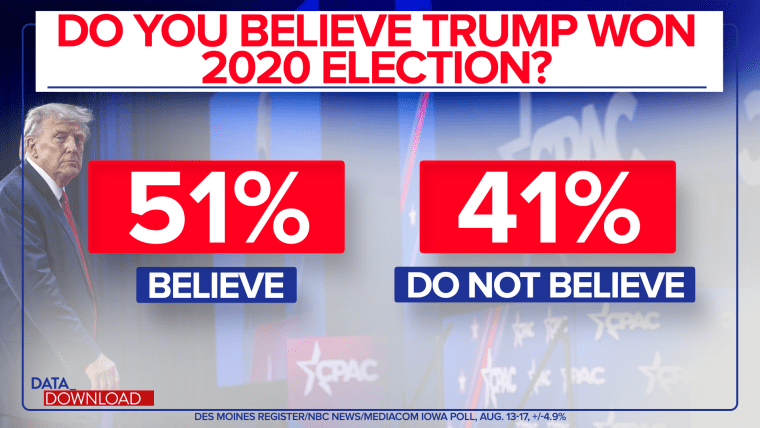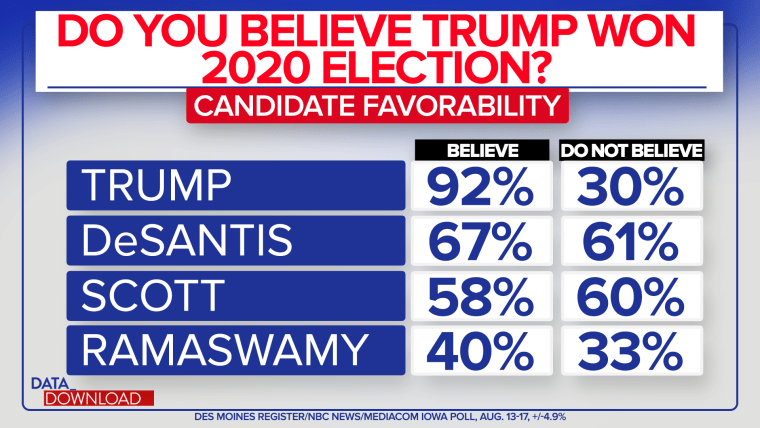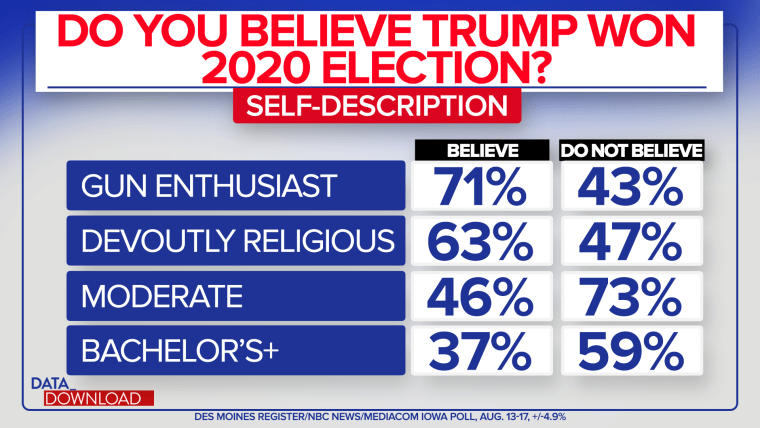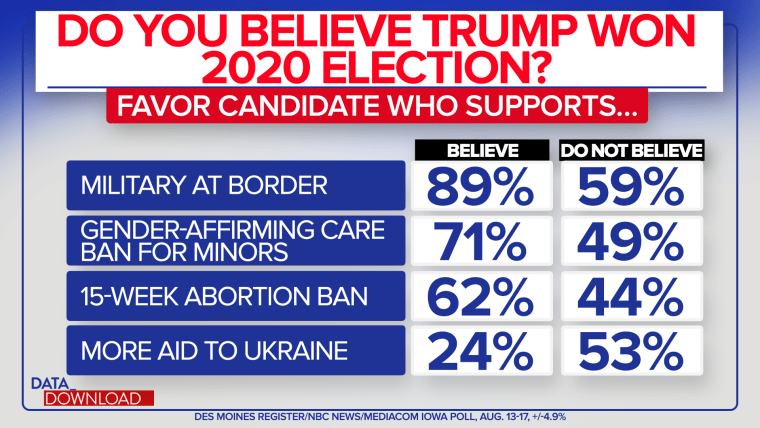WASHINGTON — There are a lot of ways to understand the 2024 GOP primary electorate, but the most crucial split may be the one between Republican voters who believe Donald Trump actually won the 2020 presidential race and Republican voters who, correctly, acknowledge the former president lost his re-election bid.
A new NBC News/Des Moines Register/Mediacom poll finds that likely caucusgoers in Iowa are fairly closely divided over the outcome of the 2020 race and that there are sharp differences between the electorate that still believes Trump won and the electorate that accepts that Trump lost.
Despite Trump’s solid lead in most primary polls and his unwavering public stance that the election was “stolen” from him, only a slim majority of likely Iowa caucus voters believe he actually won the White House in 2020.

Overall, 51% of those who expect to participate in the Jan. 15 caucuses say they believe Trump’s “claims he won the 2020 presidential election.” A sizeable minority, about 4 in 10 likely caucus voters, say they do not believe the claims, according to the poll.
The numbers suggest there could be some room for candidates who want to challenge Trump in the contest — at least theoretically.
The poll showed Trump was far and away the top choice among likely caucus voters, with 42% of their support. The next on the list was Florida Gov. Ron DeSantis, at 19%. But some of Trump’s opponents have good favorable numbers across both groups of voters: Trump 2020 election claim believers and nonbelievers.

DeSantis is viewed favorably by two-thirds of voters who believe Trump and 61% of those who do not believe. Sen. Tim Scott of South Carolina is viewed favorably by 58% of Trump believers and 60% of nonbelievers. Billionaire upstart candidate Vivek Ramaswamy has lower name recognition (more voters saying they are “not sure” about him), but he, too, does about the same with both groups of voters — 40% favorable among Trump believers and 33% among nonbelievers.
As might be expected, Trump does far better with those who still believe he won in 2020. Among believers, 92% view him favorably. Among nonbelievers, a far lower 30% view him favorably.
But the numbers suggest that denying the 2020 election results may not be a necessity for Republican candidates or for candidates in Iowa who are not named Trump.
A closer look at the data, however, suggests there are some bigger differences in who these voters are when they are asked to describe themselves.

For instance, likely caucusgoers who believe Trump’s election claims are much more likely to label themselves as gun enthusiasts, 71%, compared to nonbelievers, 43%. And Trump believers are also more likely to say they are “devoutly religious,” 63%, than those who do not believe Trump, 47%.
Meanwhile, those who do not believe Trump’s election claims are much more likely to describe themselves as “moderate” — 73% do so. Less than half of those who believe Trump’s claims describe themselves as moderate, 46%. And those who do not believe Trump are also much more likely to have bachelor’s degrees, 59%, compared to Trump believers, 37%
It is also worth noting that the Iowa poll did not show a big gender gap in who believes Trump’s claims. Believers were 58% male and 42% female. Nonbelievers were 61% male and 39% female. One big takeaway from those numbers: The likely Iowa caucusgoer pool looks very male.
Still, the demographic/identity differences in those two groups of voters (Trump believers and nonbelievers) seem to lead to some deep policy differences among Iowa’s likely caucusgoers.

Trump election believers are much more likely to favor a candidate who would use the military to secure the country’s southern border — 89% of Trump believers like that position, while 59% of nonbelievers favor a candidate with that position.
More than 7 in 10 voters who believe Trump favor a candidate who would ban gender-affirming treatment for those under 18 years of age. Only 43% of Trump nonbelievers favor that position. And 62% of those who believe Trump would favor a candidate who wants to ban abortion after 15 weeks of pregnancy. Only 44% of Trump nonbelievers want a candidate who supports a 15-week ban.
Concerning the war in Ukraine, Trump nonbelievers are much more likely to favor a candidate who wants to continue U.S. military aid to the Ukrainians — 53% of nonbelievers say that position would make them more likely to support a candidate, while only 24% of Trump believers say it would be a plus.
Taken together, the Iowa poll data suggests the 2024 primary electorate is more complicated and nuanced than many believe. Trump may be dominating the primary field in most polls and dominating the campaign coverage, but going into the 2024 cycle there may be deep divides in the GOP electorate between voters who believe Trump’s untrue claims about having won the 2020 election and those who do not.
At the very least, the NBC News/Register/Mediacom poll indicates that is the case in Iowa. If it is true elsewhere, the race for the Republican nomination could have a few more twists and turns than expected.